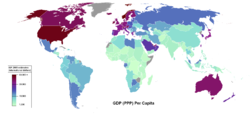Modern monetary theory or modern money theory (MMT) is a heterodox macroeconomic theory that describes currency as a public monopoly and unemployment...
65 KB (7,124 words) - 21:56, 25 May 2025
Monetary circuit theory is a heterodox theory of monetary economics, particularly money creation, often associated with the post-Keynesian school. It...
12 KB (1,648 words) - 22:12, 27 April 2025
imported inflation. Modern Monetary Theory, like all derivatives of the Chartalist school, emphasizes that in nations with monetary sovereignty, a country...
8 KB (1,019 words) - 23:25, 19 December 2024
Balanced budget (section Modern Monetary Theory)
economists, especially (but not limited to) those associated with Modern Monetary Theory (MMT), downplay the need for balanced budgets among countries that...
14 KB (1,797 words) - 04:09, 4 May 2025
Monetary economics is the branch of economics that studies the different theories of money: it provides a framework for analyzing money and considers...
114 KB (8,855 words) - 19:59, 10 June 2025
The quantity theory of money (often abbreviated QTM) is a hypothesis within monetary economics which states that the general price level of goods and...
41 KB (5,270 words) - 22:05, 24 May 2025
House of Representatives to abandon Modern Monetary Theory and recognizing that the acceptance of Modern Monetary Theory would lead to higher deficits and...
57 KB (6,421 words) - 04:16, 3 February 2025
of resources while controlling price level. In the first place, Modern Monetary Theory (MMT) rejects the monetarist explanation virtually in toto, arguing...
8 KB (972 words) - 22:50, 28 September 2024
theory suggests that governments should concentrate on long-term structural change rather than intervention through discretionary fiscal or monetary policy...
19 KB (2,602 words) - 04:46, 25 May 2025
Rational expectations (redirect from Rational expectations theory)
rational expectations for economic theory. One key implication is that government policies, such as changes in monetary or fiscal policy, may not be as effective...
14 KB (2,091 words) - 06:21, 14 May 2025
Credit theories of money, also called debt theories of money, are monetary economic theories concerning the relationship between credit and money. Proponents...
26 KB (3,220 words) - 09:50, 8 June 2025
Value (economics) (redirect from Monetary theory of value)
"Marx's Monetary Theory of Value, Fictitious Capital and Finance", 6 November 2015, p. 6. Investopedia Staff (2011-01-20). "Subjective Theory Of Value"...
20 KB (2,589 words) - 14:51, 20 May 2025
Perspectives. 8 (1): 3–22. doi:10.1257/jep.8.1.3. JSTOR 2138148. "Monetary Growth Theory". newschool.edu. 2011. Archived from the original on 21 October...
13 KB (1,464 words) - 19:55, 14 October 2024
Cost-push inflation (redirect from Cost push theory (economics))
are forced to increase prices of their outputs. It is contrasted with the theory of demand-pull inflation. Both accounts of inflation have at various times...
5 KB (505 words) - 15:09, 19 April 2025
Monetarism (redirect from Monetary rule)
Fiscalism (usually contrasted to monetarism) Market monetarism Modern Monetary Theory Money creation - process in which private banks (primarily) or Central...
27 KB (3,024 words) - 20:11, 24 May 2025
In monetary economics, the currency in circulation in a country is the value of currency or cash (banknotes and coins) that has ever been issued by the...
6 KB (758 words) - 02:03, 2 September 2024
Endogenous money (redirect from Endogenous money theory)
ISBN 1-84064-789-2 Graziani, Augusto The Monetary Theory of Production. Cambridge, 2003 Wicksell and origins of modern monetary theory-Lars Pålsson Syll...
8 KB (919 words) - 07:08, 7 January 2025
A monetary system is a system where a government manages money in a country's economy. Modern monetary systems usually consist of the national treasury...
11 KB (1,281 words) - 07:02, 10 June 2025
different macroeconomic theories; they may be used to produce "what if" scenarios (usually to predict the effects of changes in monetary, fiscal, or other macroeconomic...
20 KB (2,300 words) - 06:09, 25 January 2025
twentieth century. William Barber's comment upon Gunnar Myrdal's work on monetary theory goes like this: "If his contribution had been available to readers...
8 KB (924 words) - 09:46, 30 October 2024
in unemployment. Search theory Beveridge curve Labor economics Monetary economics Nash bargaining game Matching (graph theory) Optimal matching Pissarides...
7 KB (946 words) - 13:24, 13 July 2024
will increase their prices to 'catch up' to inflation. There is excessive monetary growth, when there is too much money in the system chasing too few goods...
4 KB (477 words) - 02:28, 28 January 2025
Therefore, they also accept the monetarist and new Keynesian view that monetary policy can have a considerable effect in the short run. The new classical...
14 KB (1,636 words) - 22:19, 21 March 2025
Money supply (redirect from Monetary aggregate)
money supply changes. As these decisions are influenced by central banks' monetary policy, not least their setting of interest rates, the money supply is...
48 KB (5,432 words) - 10:21, 25 May 2025
Chartalism (category Monetary economics)
University of Newcastle in Australia, coined the term Modern Monetary Theory to describe modern Neo-Chartalism, and that term is now widely used. Scott...
10 KB (1,222 words) - 18:50, 3 January 2025
Fiscal policy (section Monetary or fiscal policy?)
influence aggregate demand and the level of economic activity. Fiscal and monetary policy are the key strategies used by a country's government and central...
20 KB (2,623 words) - 19:51, 7 June 2025
assumptions of rational choice theory, a representative agent, and, often, rational expectations. However, much of modern economic mainstream modeling consists...
19 KB (1,952 words) - 16:29, 23 May 2025
Stephanie Kelton (category Modern monetary theory scholars)
American heterodox economist and academic, and a leading proponent of modern monetary theory. She served as an advisor to Bernie Sanders's 2016 presidential...
19 KB (1,788 words) - 23:27, 4 June 2025
primarily through fiscal policy instead of monetary policy. The theory also disputes the premise of Modern Monetary Theory that inflation can be controlled when...
7 KB (765 words) - 07:41, 5 April 2025









